How to Clean and Maintain Solar Power System for Maximum Efficiency
How to Clean and Maintain Solar Power System for Maximum Efficiency
After the solar panels used in solar power plant for generating solar energy for home/industrial/commercial roof top or ground mounted, are installed , the dirt starts to built up over the panels and can substantially affect system performance. It is required to be cleaned up from time to time regularly to avoid losses of solar energy. But while cleaning can enhance the system performance but wrong cleaning processes of materials used can lead to bad performance of the system. Therefore one needs to be careful in selecting the right materials , tools and processes for cleaning the solar power system. While the right materials , tools and processes are necessary , it is equally important to have trained manpower to do the job.
Given below are our recommendations for solar panels cleaning used in solar power plant for generating solar energy for home/industrial/commercial roof top or ground mounted.
Safety of workmen involved in cleaning:
Solar panels used in solar power plant for generating solar energy for home/industrial/commercial roof top or ground mounted, are connected in series and it can generate upto 1000V DC. Cracks in modules or damaged cable or joints in a string can pose serious dangerous situation for workmen involved in cleaning particularly when the modules are sprayed with water and are yet wet.
Even during early morning / late evening hrs of sunlight the array will generate lethal voltage. It is therefore important to inspect solar panels thoroughly for micro cracks, glass shield damage, and loose connections before solar panel cleaning is resorted to. workmen involved in cleaning should be made to wear appropriate electrically insulating gloves/shoes during cleaning. Or else the system should be switched off and cleaning should be done in zero sunlight hours.
Suitable Time for cleaning:
The recommended time for cleaning is when risk of electrical shock is minimum. That is when there is almost zero sunlight/ either just after sunrise or just before sunset.
Quality of water :
Soft water should be used to clean the modules. If soft water is not available, rainwater or potable tap water can be used. Water should have hardness of less than 75ppm. Water should be free of grit and particles or else we may see damage of panels over a period of time. cleaning agent: cleaning agent is not recommended but if one wishes then mild, non-abrasive, non-caustic detergent with water may be used. Alkali based or acidic detergents must not be used.
Removing spots:
Removing dead mosquitoes , dirts such as birds dropping, tar etc., use a soft sponge based wiper after spraying water over the spots and after wiping again cleaning with lots of water.
Drying:
Wipe the module surface with a little bit of pressure by hand through wiper from top to bottom to remove any residual water from the solar panels.
Water pressure:
Normal tap water pressure is enough at the cleaning end of nozzle. Use of high pressure for cleaning may damage the solar panels.
Water temperature:
Ambient temp of water is good enough for cleaning of panels and water should not be sprayed when the modules are hot to avoid thermal shocks. Or else we will have chances of developing micro cracks in the solar panels.
Suggested Articles
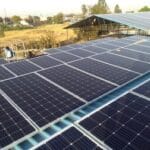
Poor vs Good Solar Installation: Key Differences Explained
A solar system’s performance depends heavily on installation quality. This blog explains the clear differences between a poor and good solar installation — from wiring practices and panel alignment to mounting structures and system safety — helping you make an informed choice and ensure long-term efficiency.
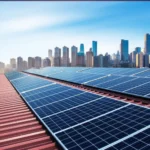
Solar Sector Growth in India Slows as Investments Decline in Q1 2023
India’s solar sector experiences an investment slowdown in Q1 2023, reflecting challenges in funding and growth for renewable energy projects.
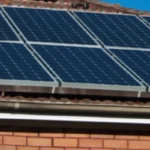
EIB Green Hydrogen India: €1 Billion Investment to Boost Clean Energy Transition
The European Investment Bank (EIB), the bank of the European Union, has joined forces with the India Hydrogen Alliance (IH2A) to increase support for the development of green hydrogen projects across India.
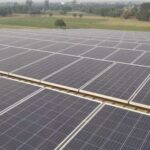
India Raises Solar Purchase Obligation (SPO) to 8%: A Complete Guide
The Solar Purchase Obligation (SPO) in India is set to increase to 8%, pushing companies to adopt more solar energy. This guide explains the implications for businesses, compliance strategies, and how organizations can align with renewable energy targets.

Researchers Develop Technique to Improve Durability of Perovskite Solar Cells
Researchers have introduced a new technique to enhance the durability of perovskite solar cells, paving the way for more reliable and long-lasting renewable energy solutions.
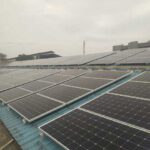
Delhi charges one of the highest tariffs for commercial load and industrial – average over Rs 10.00 per kWh
Delhi imposes some of the highest electricity tariffs for commercial and industrial consumers, averaging over ₹10 per kWh, impacting businesses and operating costs
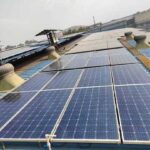
Solar Panel Sizes and Features in Delhi/NCR: A Complete Guide
Planning to install solar panels in Delhi/NCR? Explore the different sizes, technologies, and key features of solar panels available for residential, industrial, and commercial use. Learn how to choose the right one for your energy needs and roof space.

Complete Guide to Solar Panel Subsidy Scheme in Haryana
Solar power is not only less expensive, but it is also the most abundant source of clean energy.